If your commercial boiler shows signs of inefficiency, experiences frequent breakdowns, or is over 15 years old, it's likely time for a replacement. Monitor energy bills; consistent increases despite maintenance suggest inefficiencies. Additionally, assess safety concerns, such as leaks or carbon monoxide emissions. Evaluating energy efficiency ratings and comparing costs of repairs versus a new unit can provide insight. To better understand the benefits of modern boiler technology and financial considerations, further details follow.
Key insights
- Consider replacing your commercial boiler if repair costs exceed 30% of the replacement cost within a year.
- If your boiler is over 15 years old and frequently requires repairs, it's time to evaluate replacement options.
- Significant increases in energy bills despite regular maintenance may indicate inefficiency that warrants a new boiler.
- Inconsistent heating temperatures or frequent pilot light outages can signal the need for a replacement to ensure reliability.
- If safety risks like leaks or carbon monoxide emissions are present, prioritize replacing the aging boiler to protect occupants.
Understanding the Lifespan of Commercial Boilers
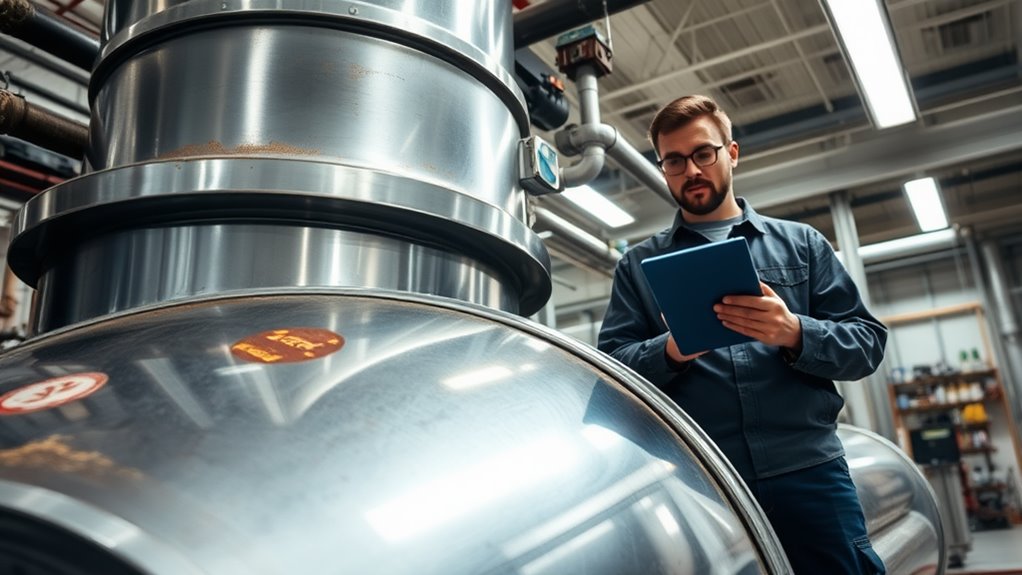
When you consider the lifespan of commercial boilers, it is essential to recognize that various factors influence their longevity, including maintenance practices, operational loads, and the quality of installation. Regular boiler maintenance is critical; it not only helps prevent unexpected failures but also considerably contributes to lifespan extension. Ensuring that your boiler operates within its designed parameters can minimize wear and tear on components. Additionally, the quality of installation plays an important role—improperly installed systems may face undue stress, leading to premature failure. By focusing on these aspects, you can maximize your boiler's efficiency and operational life. Ultimately, a proactive approach to maintenance and installation quality will safeguard your investment and optimize performance. Furthermore, regular servicing is essential for ensuring safe and efficient operation, with annual servicing recommended based on boiler age and usage.
Signs Your Boiler Is No Longer Efficient
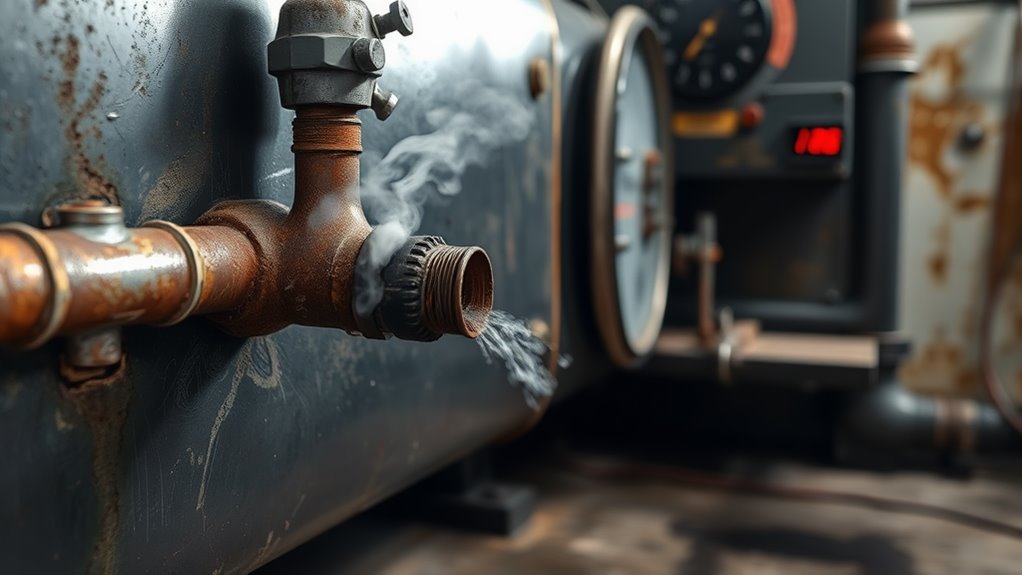
As your commercial boiler ages, several clear signs indicate it's losing efficiency and may require replacement. First, if you notice a significant increase in energy bills despite consistent boiler maintenance, that's a red flag. This often suggests your boiler is no longer operating at peak efficiency. Additionally, frequent breakdowns or repairs signal declining performance. Conducting regular energy audits can help identify inefficiencies that may not be immediately apparent. If your boiler struggles to maintain consistent temperatures or if you detect unusual noises or vibrations, these can also indicate inefficiency. Ultimately, if you're facing rising operational costs alongside these signs, it may be time to contemplate replacing your boiler to regain efficiency and reduce long-term expenses. Regular maintenance can prevent common error codes that lead to increased operational costs and inefficiencies.
Common Performance Issues to Watch For
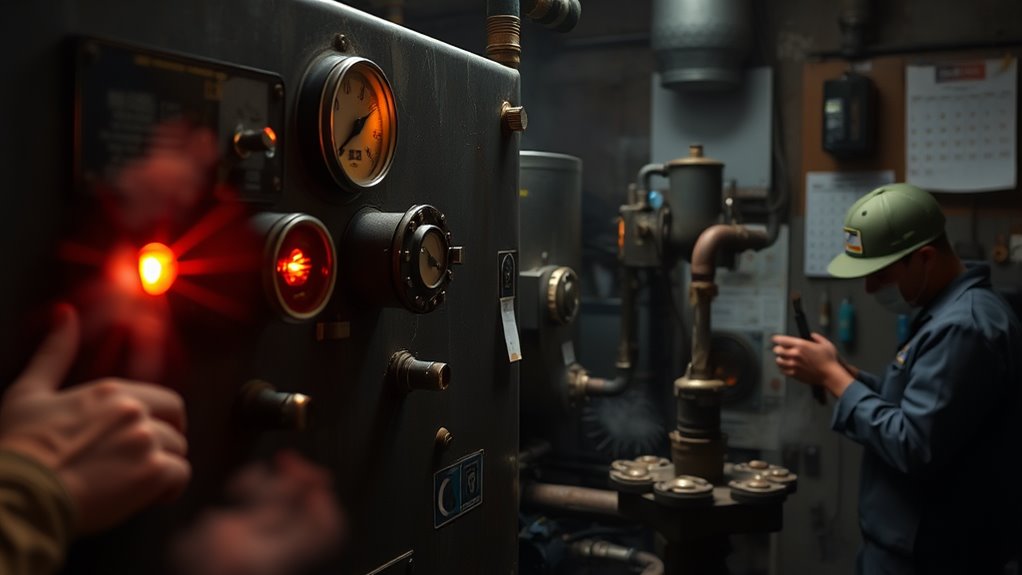
When monitoring your commercial boiler, you should pay close attention to unusual noises and vibrations, as these can indicate mechanical issues or wear. Frequent pilot light outages may signal problems with the gas supply or ignition system, which can compromise efficiency. Additionally, inconsistent heating distribution across your facility suggests underlying issues that could lead to larger operational failures. Regular maintenance helps prevent error codes and enhances boiler longevity.
Unusual Noises and Vibrations
While operating a commercial boiler, you might notice unusual noises and vibrations that signal underlying issues. These sounds, such as banging, hissing, or excessive rattling, often indicate air bubbles in the system or loose components. Addressing these symptoms promptly is vital for effective boiler maintenance, as neglecting them can lead to more significant failures. Additionally, vibrations can result from misalignment or wear in mechanical parts, which may require immediate attention. Implementing noise reduction techniques, like securing loose fittings or adjusting mounts, can enhance performance and prolong the boiler's lifespan. Regular inspections and maintenance checks are essential to identify and rectify these problems before they escalate, ensuring your boiler operates efficiently and safely. Regular maintenance is crucial for optimizing energy efficiency and preventing costly repairs.
Frequent Pilot Light Outages
Frequent pilot light outages can indicate significant performance issues within your commercial boiler. These outages undermine pilot light reliability, suggesting that your ignition system may be malfunctioning. Factors contributing to this problem can include a faulty thermocouple, which fails to detect the pilot flame, or issues with the gas supply that create inconsistent ignition. Additionally, dirt or debris in the burner assembly can disrupt the combustion process, leading to repeated pilot light failures. If you notice these outages, it's essential to address them promptly, as they not only compromise efficiency but can also pose safety risks. Regular maintenance and inspection of the ignition system can help prevent these issues, ensuring your boiler operates reliably and efficiently. Furthermore, establishing a regular inspection schedule can enhance boiler reliability by identifying potential concerns before they escalate into more significant problems.
Inconsistent Heating Distribution
Inconsistent heating distribution can severely impact the comfort and efficiency of your commercial space, often signaling underlying issues with your boiler system. If you're experiencing noticeable temperature fluctuations across different areas, it's vital to identify the cause. Blocked pipes, air trapped in the system, or malfunctioning thermostats could disrupt proper heat distribution. You might also find that certain zones receive inadequate warmth while others become overheated, indicating imbalances that can strain your boiler. Monitoring these inconsistencies is essential; they can lead to increased energy costs and uncomfortable working conditions. If adjustments or maintenance don't resolve the problems, it may be time to reflect on replacing your boiler to restore effective and uniform heat distribution throughout your facility. Additionally, regular maintenance can help prevent these issues from escalating and ensure optimal performance of your boiler system.
The Cost of Frequent Repairs
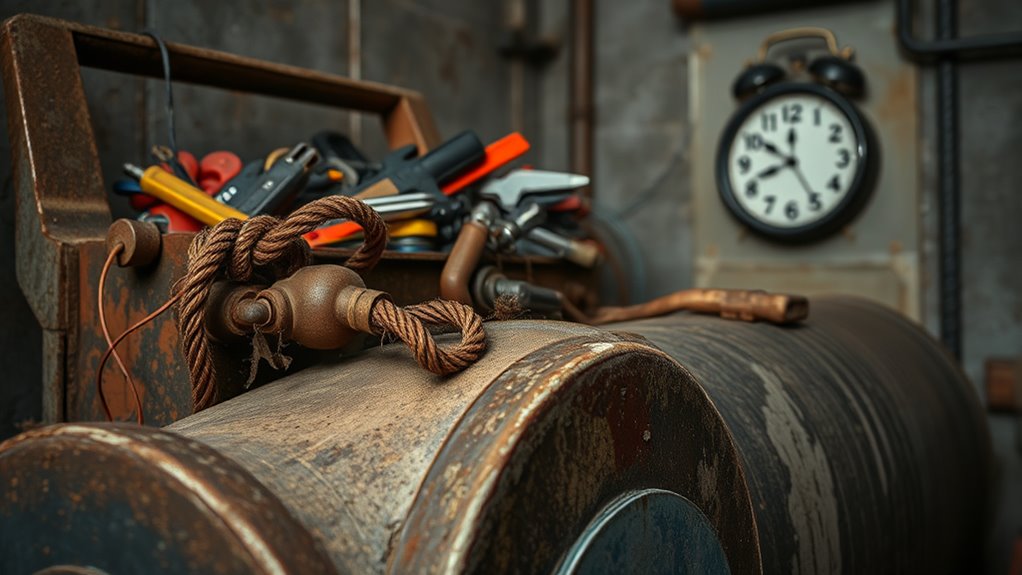
As your commercial boiler ages, the escalating costs of frequent repairs can quickly outweigh the benefits of keeping it operational. Each time you call a technician, consider the repair frequency—if you're facing multiple service calls within a year, it's a significant indicator. Repair costs add up rapidly, especially when parts become harder to source and labor rates increase. These expenses can strain your budget and divert funds from more critical areas of your business. Additionally, frequent repairs often signal underlying issues that could worsen over time. By analyzing these costs against the potential benefits of a new, efficient system, you can make a well-informed decision about whether it's time to replace your aging boiler. An energy-efficient heating and cooling solution can provide significant savings and reduce your operational costs in the long run.
Safety Hazards Associated With Aging Boilers
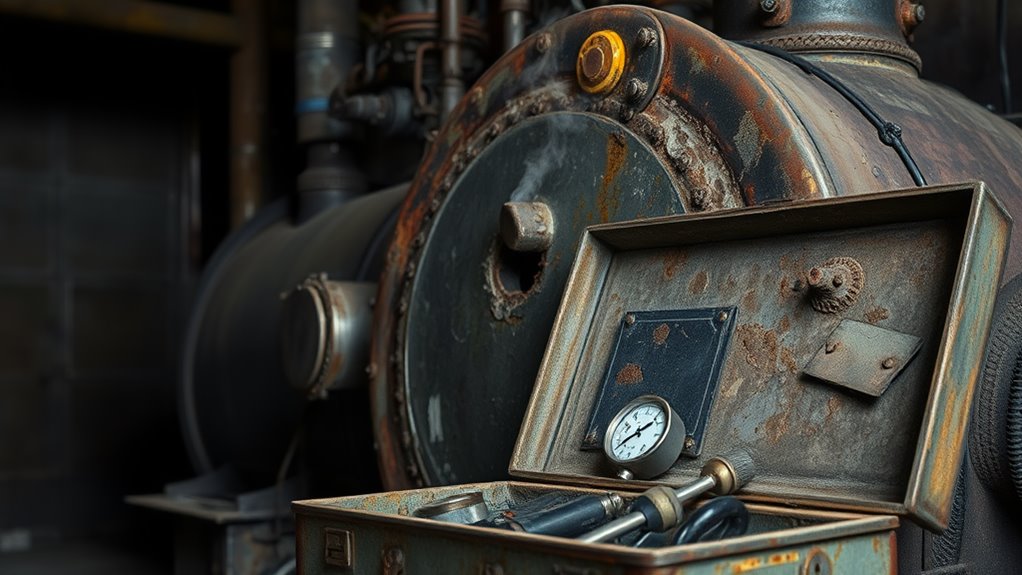
As your boiler ages, the risk of leaks greatly increases, compromising both efficiency and safety. Additionally, older systems may produce hazardous carbon monoxide emissions, posing a serious health threat. It's essential to assess these dangers regularly to guarantee a safe operating environment. Regular maintenance can help prevent low water pressure issues that may exacerbate these risks.
Increased Risk of Leaks
Aging commercial boilers present an increased risk of leaks, which can lead to significant safety hazards. You must prioritize leak detection to guarantee the integrity of your system. Regular inspections are essential, and adhering to a strict maintenance schedule can help mitigate risks. Here are key considerations to remember:
- Inspect for corrosion and wear regularly.
- Monitor pressure levels for sudden drops.
- Check connections and joints for signs of leaks.
- Utilize advanced leak detection technology.
- Train staff to recognize leak indicators. Additionally, it is crucial to monitor boiler pressure regularly, as low pressure can indicate underlying issues that may lead to leaks.
Carbon Monoxide Emissions
While commercial boilers are essential for efficient heating, they can also pose serious safety hazards if not properly maintained, particularly regarding carbon monoxide emissions. Aging boilers may develop cracks or inefficiencies, leading to incomplete combustion and increased CO production. This invisible gas can accumulate in your facility, endangering occupants. To mitigate risks, verify you have functional carbon monoxide detectors installed in strategic locations, as they provide early warnings of dangerous levels. Additionally, maintain your ventilation systems to facilitate proper airflow and exhaust, reducing the likelihood of CO buildup. Regular inspections and timely replacements are paramount to safeguard against these hazards, guaranteeing your boiler operates safely and efficiently. Furthermore, obtaining a Commercial Gas Safety Certificate ensures that your gas appliances are compliant and safe. Don't compromise on safety—act before it becomes a critical issue.
Evaluating Energy Efficiency Ratings
How can you determine the energy efficiency of your commercial boiler? Start by reviewing the energy ratings that indicate how well your boiler meets efficiency standards. You'll want to take into account several key factors:
- Annual Fuel Utilization Efficiency (AFUE): The percentage of fuel converted to usable heat.
- Energy Star Certification: Indicates compliance with strict efficiency standards.
- Manufacturer Specifications: Compare against industry benchmarks.
- Operational Costs: Assess fuel costs versus output efficiency.
- Maintenance Records: Evaluate how upkeep affects performance.
Benefits of Upgrading to Modern Boiler Technology
Modern boiler technology offers significant advantages that can enhance your facility's heating efficiency, reduce operational costs, and improve overall performance. By upgrading, you'll benefit from technology advancements that refine combustion processes, leading to higher energy savings. These modern systems often feature advanced controls and sensors that monitor performance in real-time, allowing for precise adjustments that maintain peak efficiency. Additionally, newer models typically have higher efficiency ratings, often exceeding 90%, which translates to a substantial reduction in fuel consumption. Incorporating condensing technology can further capture and utilize heat that traditional systems waste. Overall, investing in modern boiler technology not only supports sustainability goals but also guarantees your heating solutions are reliable, efficient, and cost-effective.
Financial Considerations for Replacement
When contemplating the financial implications of replacing a commercial boiler, it's essential to evaluate both immediate costs and long-term savings. You'll want to balance your budget constraints against the potential benefits of a new system. Key factors to take into account include:
- Initial purchase and installation costs
- Energy efficiency ratings and potential savings on utility bills
- Maintenance and repair costs of the existing boiler
- Expected lifespan of the new system versus the old one
- Available incentives or rebates for energy-efficient upgrades
Consulting With a Professional Technician
Evaluating your financial considerations often leads to the next step: consulting with a professional technician. This conversation is vital, as technician expertise can provide insights that go beyond your initial evaluations. A qualified technician will conduct a thorough examination of your current boiler's condition, reviewing its efficiency, safety, and overall performance. They'll consider your boiler maintenance history and identify any recurring issues that may indicate impending failure. In addition, a technician can recommend whether repair or replacement is more cost-effective in the long run. Their specialized knowledge helps you navigate complex regulations and guarantees compliance with local codes. Ultimately, their professional appraisal will guide your decision, helping you invest wisely in your commercial heating system.
Frequently Asked Questions
How Do Seasonal Changes Affect Boiler Performance and Efficiency?
Seasonal changes greatly impact your boiler's performance and efficiency. As temperature fluctuations occur, your boiler must adapt to varying heating demands, affecting its seasonal efficiency. During colder months, the system works harder, potentially leading to increased wear and reduced efficiency. Conversely, in milder weather, it may operate below ideal levels. Regular maintenance is essential to guarantee that your boiler adapts effectively to these changes, maintaining efficiency and prolonging its lifespan.
Can Regular Maintenance Extend the Lifespan of My Commercial Boiler?
Yes, regular maintenance can greatly extend your commercial boiler's lifespan. By prioritizing boiler upkeep, you guarantee peak performance and efficiency. Routine checks identify potential issues early, preventing costly breakdowns and repairs. Additionally, maintenance benefits include improved energy efficiency and reduced operational costs. Neglecting maintenance can lead to more severe problems, shortening your boiler's life. Staying proactive with servicing safeguards your investment and enhances the reliability of your heating system.
What Are the Environmental Impacts of Outdated Boiler Technology?
Outdated boiler technology greatly impacts the environment, primarily through increased carbon emissions. These older systems often lack energy efficiency, leading to higher fuel consumption and waste. As you operate inefficient boilers, you're not only contributing to greenhouse gas emissions but also incurring higher operational costs. Upgrading to modern, energy-efficient models can reduce your carbon footprint and improve overall performance, aligning your operations with sustainability goals while promoting environmental responsibility.
Are There Financing Options Available for Boiler Replacement?
Yes, there are several financing solutions available for boiler replacement. You should explore options like equipment leasing, energy efficiency loans, or government incentives, which can greatly ease your budget considerations. Many providers offer tailored financing packages that align with your cash flow needs, allowing you to invest in modern technology without straining your finances. By analyzing your options carefully, you can select the best financing solution that meets your operational and financial goals.
How Can I Choose the Right Size Boiler for My Facility?
To choose the right size boiler for your facility, you need to analyze your heating requirements. Start by calculating the total BTU needs based on your facility's square footage, insulation, and specific usage patterns. Consider peak demand periods and any future expansion plans. Accurate boiler sizing guarantees efficiency, preventing excessive energy costs and equipment strain. Consulting with a professional can help align your boiler's capacity with your facility requirements effectively.
Summary
In summary, knowing when to replace your commercial boiler is essential for maintaining efficiency and safety. If your boiler shows signs of inefficiency, frequent breakdowns, or safety hazards, it's time to contemplate an upgrade. Modern boilers not only enhance energy efficiency but can also reduce operating costs in the long run. Consulting with a professional technician can help you evaluate your options and make an informed decision that aligns with your business's financial and operational needs.

